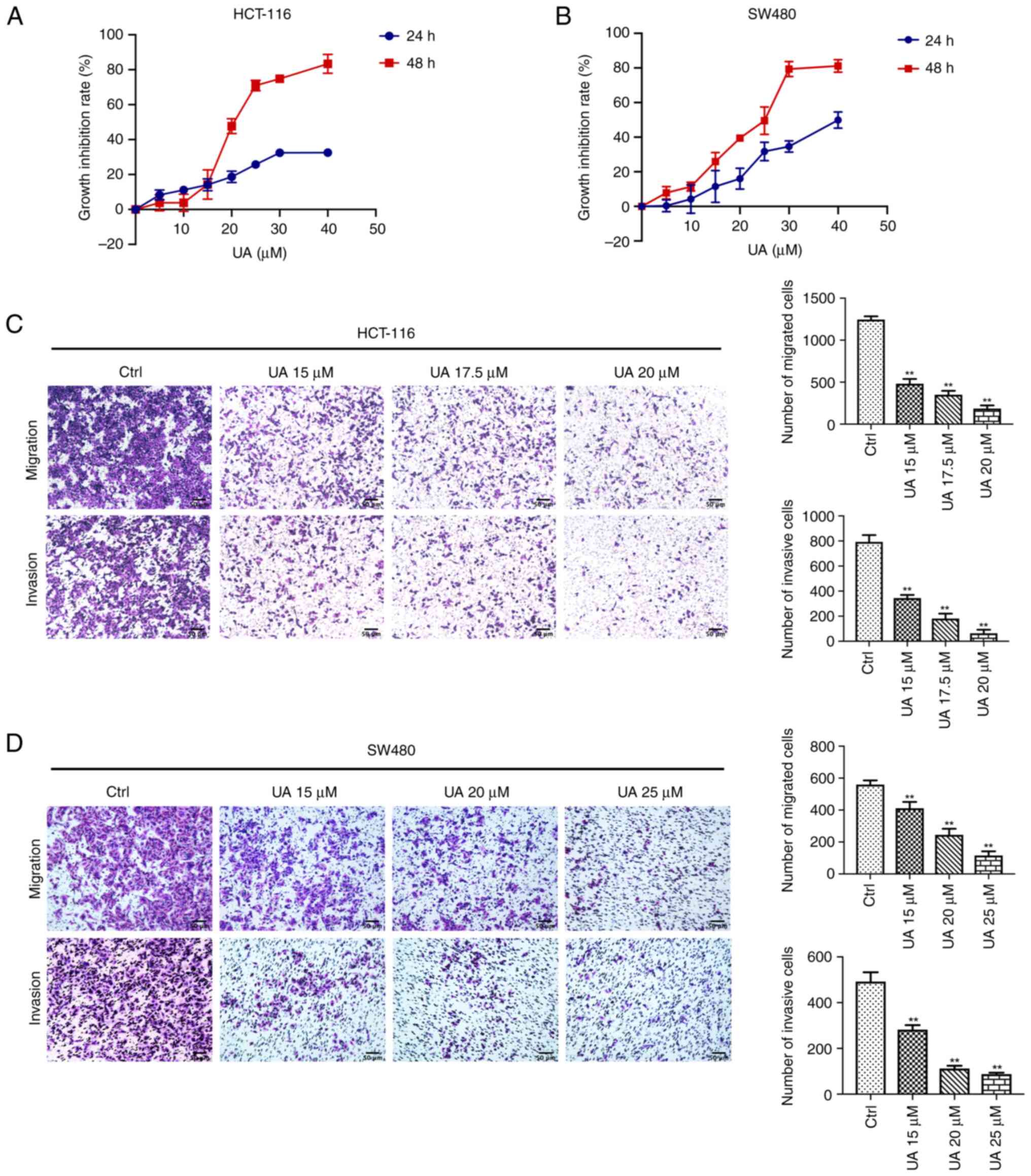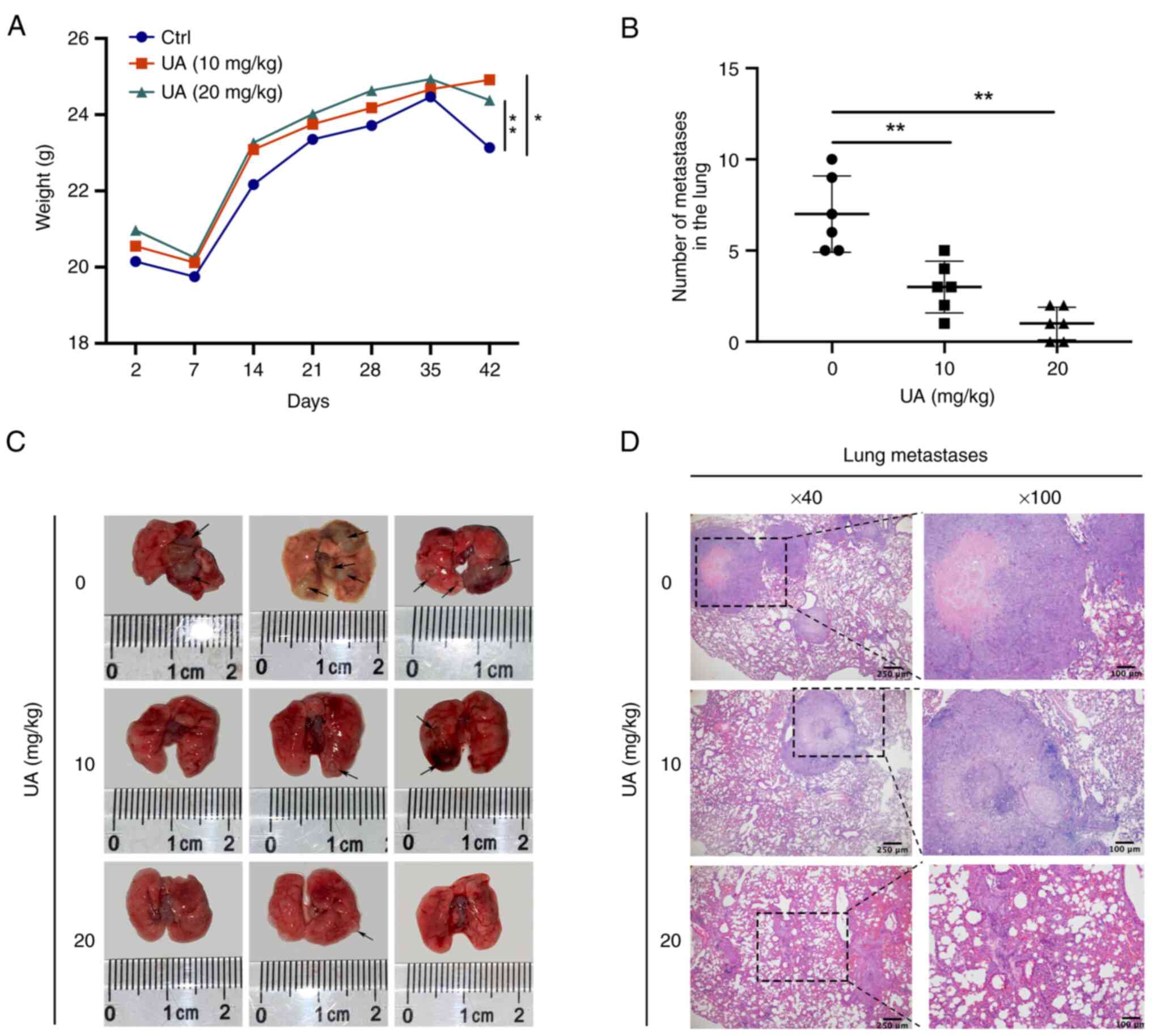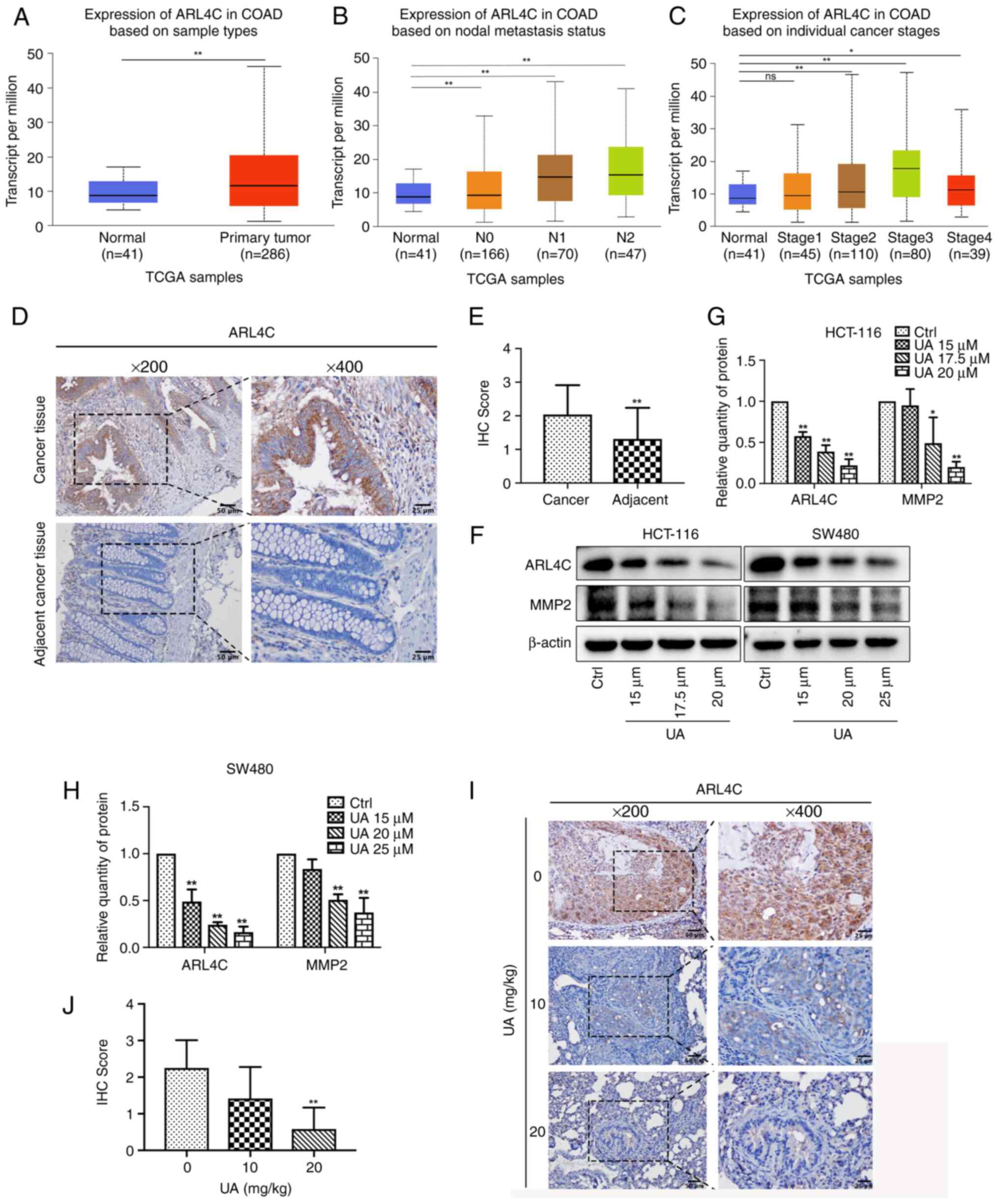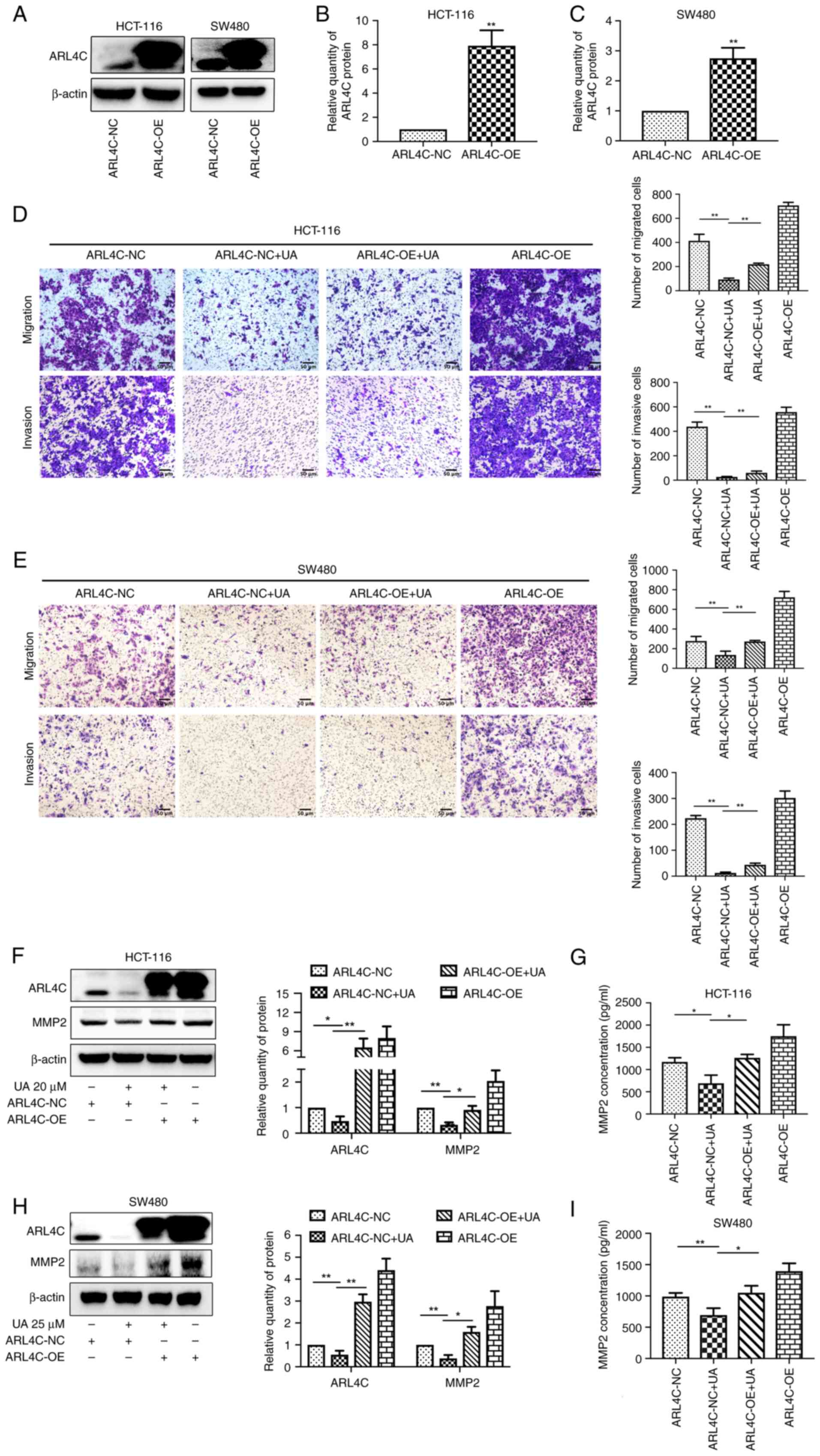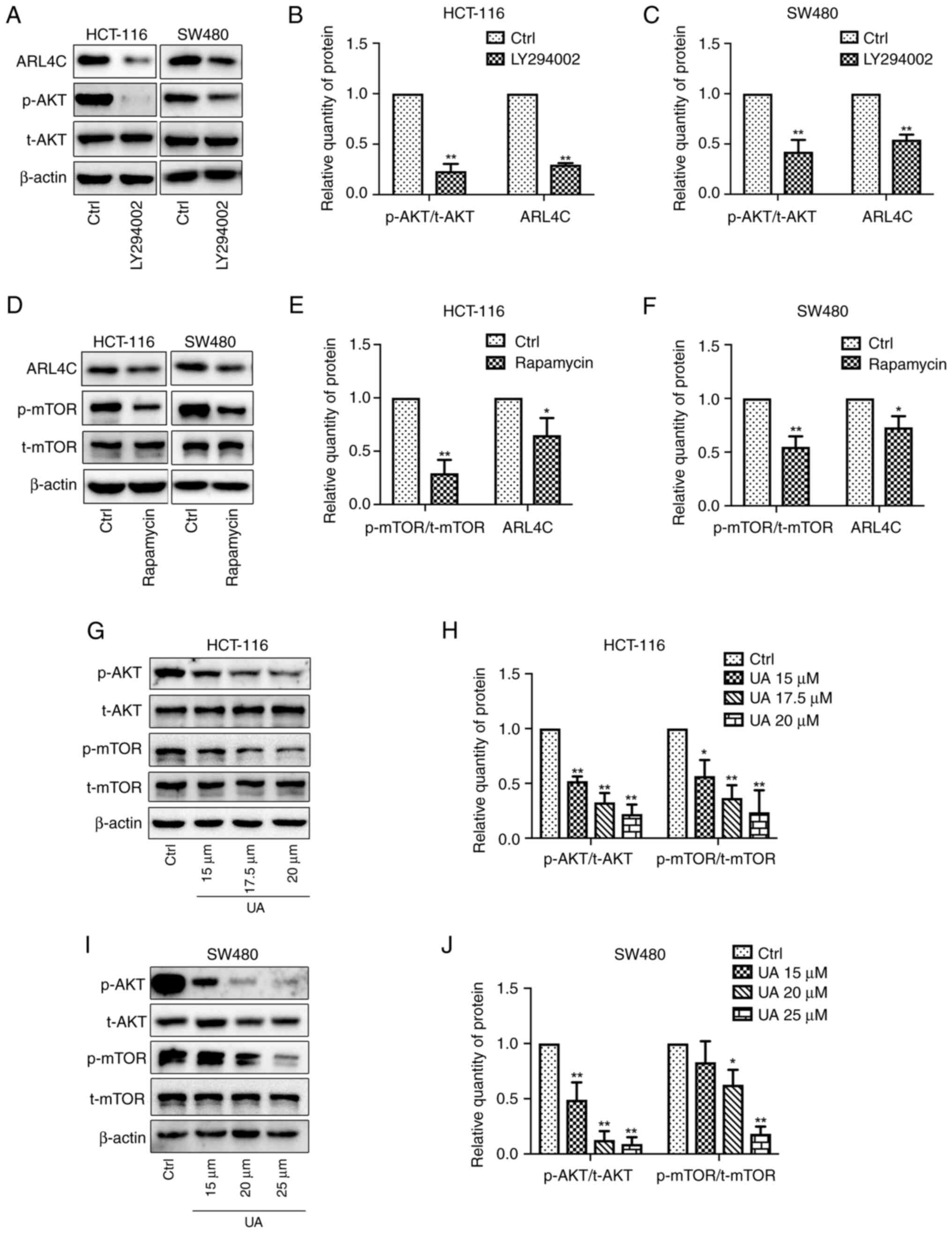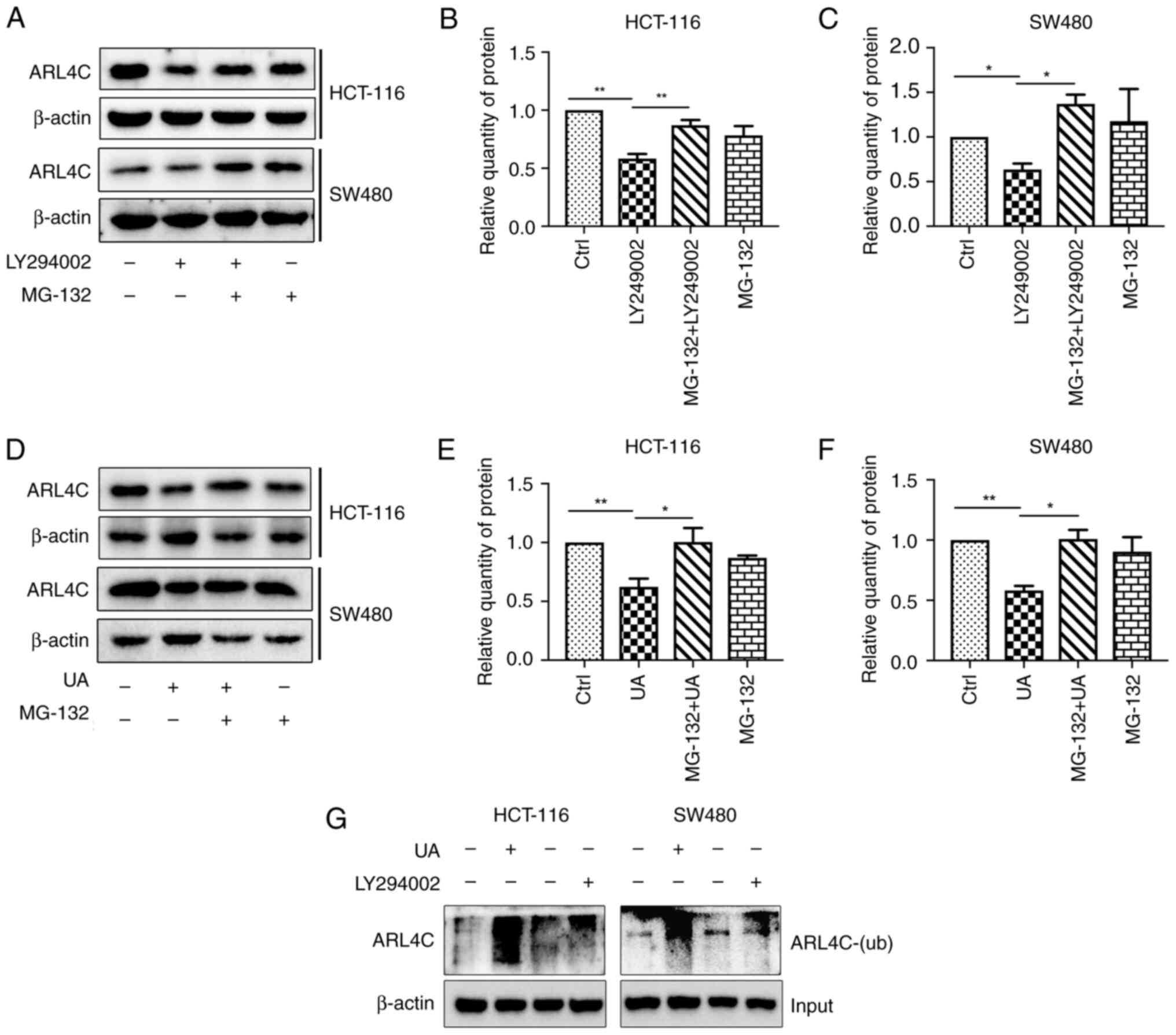|
1
|
Sung H, Ferlay J, Siegel RL, Laversanne M,
Soerjomataram I, Jemal A and Bray F: Global cancer statistics 2020:
GLOBOCAN estimates of incidence and mortality worldwide for 36
cancers in 185 countries. CA Cancer J Clin. 71:209–249. 2021.
View Article : Google Scholar : PubMed/NCBI
|
|
2
|
Xu W, He Y, Wang Y, Li X, Young J,
Ioannidis JPA, Dunlop MG and Theodoratou E: Risk factors and risk
prediction models for colorectal cancer metastasis and recurrence:
An umbrella review of systematic reviews and meta-analyses of
observational studies. BMC Med. 18:1722020. View Article : Google Scholar : PubMed/NCBI
|
|
3
|
Liang Z, Xie H, Shen W, Shao L, Zeng L,
Huang X, Zhu Q, Zhai X, Li K, Qiu Z, et al: The synergism of
natural compounds and conventional therapeutics against colorectal
cancer progression and metastasis. Front Biosci (Landmark Ed).
27:2632022. View Article : Google Scholar : PubMed/NCBI
|
|
4
|
Islam MR, Akash S, Rahman MM, Nowrin FT,
Akter T, Shohag S, Rauf A, Aljohani ASM and Simal-Gandara J: Colon
cancer and colorectal cancer: Prevention and treatment by potential
natural products. Chem Biol Interact. 368:1101702022. View Article : Google Scholar : PubMed/NCBI
|
|
5
|
Burd CG, Strochlic TI and Setty SR:
Arf-like GTPases: Not so Arf-like after all. Trends Cell Biol.
14:687–694. 2004. View Article : Google Scholar : PubMed/NCBI
|
|
6
|
Chiang TS, Wu HF and Lee FS:
ADP-ribosylation factor-like 4C binding to filamin-A modulates
filopodium formation and cell migration. Mol Biol Cell.
28:3013–3028. 2017. View Article : Google Scholar : PubMed/NCBI
|
|
7
|
Chiang TS, Lin MC, Tsai MC, Chen CH, Jang
LT and Lee FS: ADP-ribosylation factor-like 4A interacts with Robo1
to promote cell migration by regulating Cdc42 activation. Mol Biol
Cell. 30:69–81. 2019. View Article : Google Scholar : PubMed/NCBI
|
|
8
|
Matsumoto S, Fujii S, Sato A, Ibuka S,
Kagawa Y, Ishii M and Kikuchi A: A combination of Wnt and growth
factor signalling induces ARL4C expression to form epithelial
tubular structures. EMBO J. 33:702–718. 2014. View Article : Google Scholar : PubMed/NCBI
|
|
9
|
Wei SM, Xie CG, Abe Y and Cai JT:
ADP-ribosylation factor-like 7 (ARL7) interacts with alpha-tubulin
and modulates intracellular vesicular transport. Biochem Biophys
Res Commun. 384:352–356. 2009. View Article : Google Scholar : PubMed/NCBI
|
|
10
|
Matsumoto S, Fujii S and Kikuchi A: ARL4C
is a key regulator of tubulogenesis and tumourigenesis as a target
gene of Wnt-beta-catenin and growth factor-Ras signalling. J
Biochem. 161:27–35. 2017. View Article : Google Scholar : PubMed/NCBI
|
|
11
|
Chen Q, Fu WJ, Tang XP, Wang L, Niu Q,
Wang S, Lin Y, Cao MF, Hu R, Wen HY, et al: ADP-Ribosylation Factor
Like GTPase 4C (ARL4C) augments stem-like traits of glioblastoma
cells by upregulating ALDH1A3. J Cancer. 12:818–826. 2021.
View Article : Google Scholar : PubMed/NCBI
|
|
12
|
Hu Q, Masuda T, Sato K, Tobo T, Nambara S,
Kidogami S, Hayashi N, Kuroda Y, Ito S, Eguchi H, et al:
Identification of ARL4C as a peritoneal dissemination-associated
gene and its clinical significance in gastric cancer. Ann Surg
Oncol. 25:745–753. 2018. View Article : Google Scholar : PubMed/NCBI
|
|
13
|
Xie N, Pan Y, Wu J, Bai Y, Xiao C, Gao X,
Wang J and Liu N: MicroRNA-302s might regulate ARL4C-mediated
gastric cancer progression via p53 signaling: Bioinformatics
analysis and experiments validation. Onco Targets Ther.
14:2541–2553. 2021. View Article : Google Scholar : PubMed/NCBI
|
|
14
|
Harada T, Matsumoto S, Hirota S, Kimura H,
Fujii S, Kasahara Y, Gon H, Yoshida T, Itoh T, Haraguchi N, et al:
Chemically modified antisense oligonucleotide against ARL4C
inhibits primary and metastatic liver tumor growth. Mol Cancer
Ther. 18:602–612. 2019. View Article : Google Scholar : PubMed/NCBI
|
|
15
|
Amin AR, Kucuk O, Khuri FR and Shin DM:
Perspectives for cancer prevention with natural compounds. J Clin
Oncol. 27:2712–2725. 2009. View Article : Google Scholar : PubMed/NCBI
|
|
16
|
Wozniak L, Skapska S and Marszalek K:
Ursolic Acid-A pentacyclic triterpenoid with a wide spectrum of
pharmacological activities. Molecules. 20:20614–20641. 2015.
View Article : Google Scholar : PubMed/NCBI
|
|
17
|
Yin R, Li T, Tian JX, Xi P and Liu RH:
Ursolic acid, a potential anticancer compound for breast cancer
therapy. Crit Rev Food Sci Nutr. 58:568–574. 2018. View Article : Google Scholar : PubMed/NCBI
|
|
18
|
Castrejon-Jimenez NS, Leyva-Paredes K,
Baltierra-Uribe SL, Castillo-Cruz J, Campillo-Navarro M,
Hernandez-Perez AD, Luna-Angulo AB, Chacon-Salinas R, Coral-Vazquez
RM, Estrada-Garcia I, et al: Ursolic and Oleanolic acids induce
mitophagy in A549 human lung cancer cells. Molecules. 24:34442019.
View Article : Google Scholar : PubMed/NCBI
|
|
19
|
Lin CW, Chin HK, Lee SL, Chiu CF, Chung
JG, Lin ZY, Wu CY, Liu YC, Hsiao YT, Feng CH, et al: Ursolic acid
induces apoptosis and autophagy in oral cancer cells. Environ
Toxicol. 34:983–991. 2019. View Article : Google Scholar : PubMed/NCBI
|
|
20
|
Mu D, Zhou G, Li J, Su B and Guo H:
Ursolic acid activates the apoptosis of prostate cancer via
ROCK/PTEN mediated mitochondrial translocation of cofilin-1. Oncol
Lett. 15:3202–3206. 2018.PubMed/NCBI
|
|
21
|
Kim K, Shin EA, Jung JH, Park JE, Kim DS,
Shim BS and Kim SH: Ursolic acid induces apoptosis in colorectal
cancer cells partially via upregulation of MicroRNA-4500 and
inhibition of JAK2/STAT3 phosphorylation. Int J Mol Sci.
20:1142018. View Article : Google Scholar : PubMed/NCBI
|
|
22
|
Lin JH, Chen SY, Lu CC, Lin JA and Yen GC:
Ursolic acid promotes apoptosis, autophagy, and chemosensitivity in
gemcitabine-resistant human pancreatic cancer cells. Phytother Res.
34:2053–2066. 2020. View
Article : Google Scholar : PubMed/NCBI
|
|
23
|
Shanmugam MK, Manu KA, Ong TH,
Ramachandran L, Surana R, Bist P, Lim LH, Kumar AP, Hui KM and
Sethi G: Inhibition of CXCR4/CXCL12 signalling axis by ursolic acid
leads to suppression of metastasis in transgenic adenocarcinoma of
mouse prostate model. Int J Cancer. 129:1552–1563. 2011. View Article : Google Scholar : PubMed/NCBI
|
|
24
|
Zhang X, Li T, Gong ES and Liu RH:
Antiproliferative activity of Ursolic acid in MDA-MB-231 human
breast cancer cells through Nrf2 pathway regulation. J Agric Food
Chem. 68:7404–7415. 2020. View Article : Google Scholar : PubMed/NCBI
|
|
25
|
Zhang L, Cai QY, Liu J, Peng J, Chen YQ,
Sferra TJ and Lin JM: Ursolic acid suppresses the invasive
potential of colorectal cancer cells by regulating the
TGF-β1/ZEB1/miR-200c signalling pathway. Oncol Lett. 18:3274–3282.
2019.PubMed/NCBI
|
|
26
|
Xiang F, Fan Y, Ni Z, Liu Q, Zhu Z, Chen
Z, Hao W, Yue H, Wu R and Kang X: Ursolic acid reverses the
chemoresistance of breast cancer cells to paclitaxel by targeting
MiRNA-149-5p/MyD88. Front Oncol. 9:5012019. View Article : Google Scholar : PubMed/NCBI
|
|
27
|
Zheng J, Wang SS, Shen KP, Huang XW, Li M,
Chen L, Peng X, An HM and Hu B: Ursolic acid potentiated
oxaliplatin to induce apoptosis in colorectal cancer RKO cells.
Pharmazie. 75:246–249. 2020.PubMed/NCBI
|
|
28
|
Zhang N, Liu S, Shi S, Chen Y, Xu F, Wei X
and Xu Y: Solubilization and delivery of Ursolic acid for
modulating tumour microenvironment and regulatory T cell activities
in cancer immunotherapy. J Control Release. 320:168–178. 2020.
View Article : Google Scholar : PubMed/NCBI
|
|
29
|
Lin J, Chen Y, Wei L, Shen A, Sferra TJ,
Hong Z and Peng J: Ursolic acid promotes colorectal cancer cell
apoptosis and inhibits cell proliferation via modulation of
multiple signalling pathways. Int J Oncol. 43:1235–1243. 2013.
View Article : Google Scholar : PubMed/NCBI
|
|
30
|
Wang J, Liu L, Qiu H, Zhang X, Guo W, Chen
W, Tian Y, Fu L, Shi D, Cheng J, et al: Ursolic acid simultaneously
targets multiple signalling pathways to suppress proliferation and
induce apoptosis in colon cancer cells. PLoS One. 8:e638722013.
View Article : Google Scholar : PubMed/NCBI
|
|
31
|
Lin J, Chen Y, Wei L, Hong Z, Sferra TJ
and Peng J: Ursolic acid inhibits colorectal cancer angiogenesis
through suppression of multiple signalling pathways. Int J Oncol.
43:1666–1674. 2013. View Article : Google Scholar : PubMed/NCBI
|
|
32
|
Ribeiro Vitorino T, Ferraz do Prado A,
Bruno de Assis Cau S and Rizzi E: MMP-2 and its implications on
cardiac function and structure: Interplay with inflammation in
hypertension. Biochem Pharmacol. 215:1156842023. View Article : Google Scholar : PubMed/NCBI
|
|
33
|
Chen Q, Weng HY, Tang XP, Lin Y, Yuan Y,
Li Q, Tang Z, Wu HB, Yang S, Li Y, et al: ARL4C stabilized by
AKT/mTOR pathway promotes the invasion of PTEN-deficient primary
human glioblastoma. J Pathol. 247:266–278. 2019. View Article : Google Scholar : PubMed/NCBI
|
|
34
|
Sun Y, Zhang Z, Xiang F, Zhang M, Chen Q,
Tang L, Zhu L, Liu J, Meng Z, Hu J, et al: Decreasing ARL4C
expression by inhibition of AKT signal in human lung adenocarcinoma
cells. Life Sci. 246:1174282020. View Article : Google Scholar : PubMed/NCBI
|
|
35
|
Han JS, Hino K, Li W, Reyes RV, Canales
CP, Miltner AM, Haddadi Y, Sun J, Chen CY, La Torre A and Simo S:
CRL5-dependent regulation of the small GTPases ARL4C and ARF6
controls hippocampal morphogenesis. Proc Natl Acad Sci USA.
117:23073–23084. 2020. View Article : Google Scholar : PubMed/NCBI
|
|
36
|
Kanai R, Uehara T, Yoshizawa T, Kamakura
M, Nakajima T, Kinugawa Y, Iwaya M, Asaka S, Kitazawa M, Nagaya T
and Ota H: ARL4C is associated with epithelial-to-mesenchymal
transition in colorectal cancer. BMC Cancer. 23:4782023. View Article : Google Scholar : PubMed/NCBI
|
|
37
|
Alkhatib DZR, Thi Kim Truong T, Fujii S,
Hasegawa K, Nagano R, Tajiri Y and Kiyoshima T: Stepwise activation
of p63 and the MEK/ERK pathway induces the expression of ARL4C to
promote oral squamous cell carcinoma cell proliferation. Pathol Res
Pract. 246:1544932023. View Article : Google Scholar : PubMed/NCBI
|
|
38
|
Harada A, Matsumoto S, Yasumizu Y, Shojima
K, Akama T, Eguchi H and Kikuchi A: Localization of KRAS downstream
target ARL4C to invasive pseudopods accelerates pancreatic cancer
cell invasion. Elife. 10:e667212021. View Article : Google Scholar : PubMed/NCBI
|
|
39
|
Zhang P, Xu Y, Chen S, Wang Z, Zhao L,
Chen C, Kang W, Han R, Qiu J, Wang Q, et al: ARL4C regulates the
progression of clear cell renal cell carcinoma by affecting the
Wnt/β-catenin signaling pathway. J Oncol.
2022:27245152022.PubMed/NCBI
|
|
40
|
Su D, Katsaros D, Xu S, Xu H, Gao Y,
Biglia N, Feng J, Ying L, Zhang P, Benedetto C and Yu H:
ADP-ribosylation factor-like 4C (ARL4C), a novel ovarian cancer
metastasis suppressor, identified by integrated genomics. Am J
Transl Res. 7:242–256. 2015.PubMed/NCBI
|
|
41
|
Li L, Sun RM and Jiang GQ: ATF3
Demethylation promotes the transcription of ARL4C, which acts as a
tumor suppressor in human breast cancer. Onco Targets Ther.
13:3467–3476. 2020. View Article : Google Scholar : PubMed/NCBI
|
|
42
|
Chen X, Su Z, Wang S and Xu H: Clinical
and prognostic significance of ARL4C expression in colorectal
cancer. Cancer Biomark. 16:253–257. 2016. View Article : Google Scholar : PubMed/NCBI
|
|
43
|
Kim JH, Kim YH, Song GY, Kim DE, Jeong YJ,
Liu KH, Chung YH and Oh S: Ursolic acid and its natural derivative
corosolic acid suppress the proliferation of APC-mutated colon
cancer cells through the promotion of beta-catenin degradation.
Food Chem Toxicol. 67:87–95. 2014. View Article : Google Scholar : PubMed/NCBI
|
|
44
|
Kim SH, Jin H, Meng RY, Kim DY, Liu YC,
Chai OH, Park BH and Kim SM: Activating hippo pathway via Rassf1 by
Ursolic acid suppresses the tumorigenesis of gastric cancer. Int J
Mol Sci. 20:47092019. View Article : Google Scholar : PubMed/NCBI
|
|
45
|
Lee KC, Chen YL, Lin PY and Chuang WL:
Ursolic Acid-induced apoptosis via regulation of the PI3K/Akt and
MAPK signaling pathways in Huh-7 cells. Molecules. 23:20162018.
View Article : Google Scholar : PubMed/NCBI
|
|
46
|
Shan JZ, Xuan YY, Zheng S, Dong Q and
Zhang SZ: Ursolic acid inhibits proliferation and induces apoptosis
of HT-29 colon cancer cells by inhibiting the EGFR/MAPK pathway. J
Zhejiang Univ Sci B. 10:668–674. 2009. View Article : Google Scholar : PubMed/NCBI
|
|
47
|
Revathidevi S and Munirajan AK: Akt in
cancer: Mediator and more. Semin Cancer Biol. 59:80–91. 2019.
View Article : Google Scholar : PubMed/NCBI
|
|
48
|
Harsha C, Banik K, Ang HL, Girisa S,
Vikkurthi R, Parama D, Rana V, Shabnam B, Khatoon E, Kumar AP and
Kunnumakkara AB: Targeting AKT/mTOR in oral cancer: Mechanisms and
advances in clinical trials. Int J Mol Sci. 21:32852020. View Article : Google Scholar : PubMed/NCBI
|
|
49
|
Deng J, Bai X, Feng X, Ni J, Beretov J,
Graham P and Li Y: Inhibition of PI3K/Akt/mTOR signalling pathway
alleviates ovarian cancer chemoresistance through reversing
epithelial-mesenchymal transition and decreasing cancer stem cell
marker expression. BMC Cancer. 19:6182019. View Article : Google Scholar : PubMed/NCBI
|
|
50
|
Zhang X, Shi H, Tang H, Fang Z, Wang J and
Cui S: miR-218 inhibits the invasion and migration of colon cancer
cells by targeting the PI3K/Akt/mTOR signalling pathway. Int J Mol
Med. 35:1301–1308. 2015. View Article : Google Scholar : PubMed/NCBI
|
|
51
|
Fujii S, Ishibashi T, Kokura M, Fujimoto
T, Matsumoto S, Shidara S, Kurppa KJ, Pape J, Caton J, Morgan PR,
et al: RAF1-MEK/ERK pathway-dependent ARL4C expression promotes
ameloblastoma cell proliferation and osteoclast formation. J
Pathol. 256:119–133. 2022. View Article : Google Scholar : PubMed/NCBI
|















